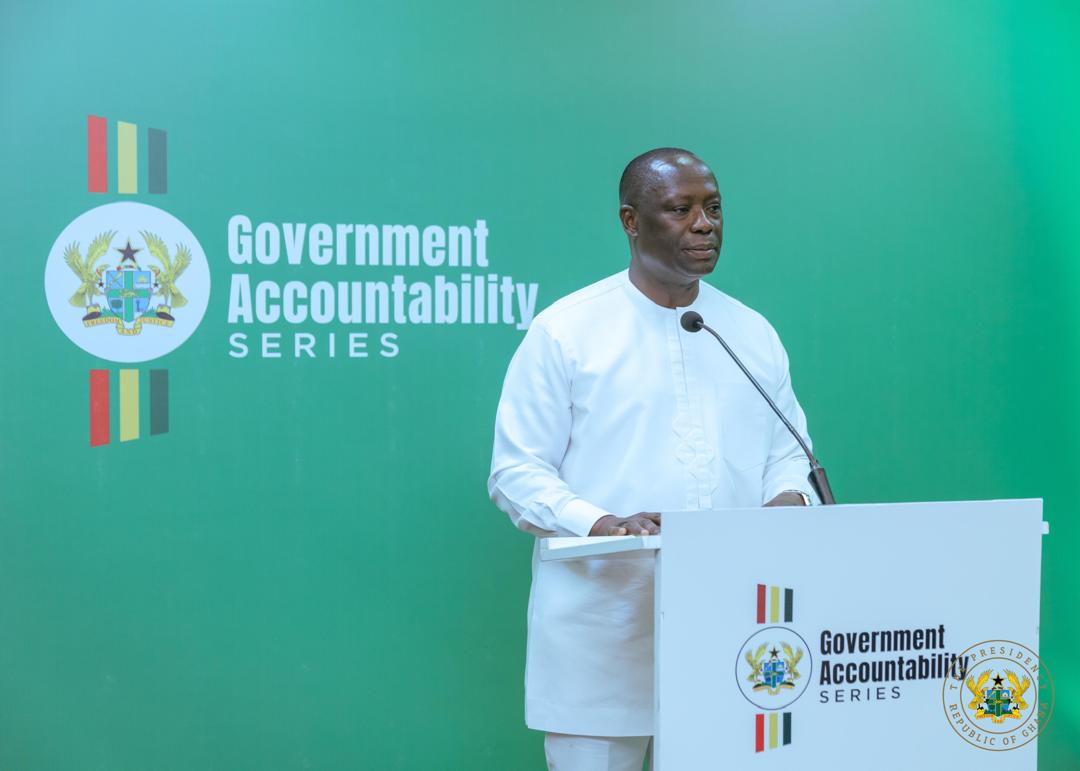
Anti-Galamsey Operations Net 1,345 Arrests – Lands Minister
July 23, 2025 Lands and Natural Resources 0 CommentMinister for Lands and Natural Resources Armah Kofi Buah has announced that the government has arrested 1,345 people in its ongoing fight against illegal mining activities.
Speaking at the Government Accountability Series in Accra on Wednesday, the Minister for Lands and Natural Resources, Emmanuel Armah-Kofi Buah, said the operations, conducted in collaboration with the Ghana Police Service, Ghana Armed Forces, and National Security Secretariat, have resulted in the seizure of various mining equipment across the country.
“425 excavators and other machinery have been seized. We have also made 1,345 arrests nationwide since we started, and prosecutions are steadily progressing,” the Minister said.
The minister revealed that the Forestry Commission alone has confiscated 177 excavators, 4 bulldozers, 12 vehicles, 43 motorcycles, 155 pumping machines, 184 Chanfans, 15 detector machines, and 10 heavy-duty generators from forest reserves. The commission has arrested 286 people in these operations.
To coordinate the multi-agency response, Buah said the government has established the National Anti-Illegal Mining Operations Secretariat (NAMOS) as the operational center for combating illegal small-scale mining and its environmental impact on water bodies and forest reserves.
Working with the Ministry of Transport and the Ghana Revenue Authority’s Customs Division, the minister disclosed that authorities have begun tracking all imports of excavators and earth-moving equipment at entry points. So far, 1,200 excavators have been impounded at ports pending validation before clearance.
“We are now able to track the excavators before they even set off to come to Ghana,” the Minister explained, adding that the ministry has deployed the Ghana Mine Repository and Tracking Software at the Minerals Commission, creating a centralized digital platform that integrates multiple agencies, including Customs, DVLE, National Security, and NAMOS.
A pilot project currently tracks 191 excavators in a dedicated control room.
The minister announced that government has trained and deployed 450 Blue Water Guards to protect water bodies from illegal mining activities within the first 120 days of the administration, fulfilling a manifesto promise.
A second batch of 530 Blue Water Guards will graduate this Friday, July 25, bringing the total deployed personnel to 980. Government aims to train 2,000 Blue Water Guards by the end of the year.
“The deployment strategy for the Blue Water Guards is non-confrontational. They act as intelligence officers and also engage with local communities to raise awareness about the importance of environmental conservation,” Mr Kofi Buah said.
He explained that the guards work to educate communities about environmental conservation and the negative effects of illegal mining rather than engaging in confrontation with miners.
The Blue Water Initiative will enter its second phase, focusing on dechemicalizing polluted water bodies to restore them to their original conditions. Feasibility studies for this restoration phase are currently underway.
As part of efforts to clean up the sector, The Minister revealed that authorities revoked 55 small-scale mining licenses issued during the transitional period at the beginning of the year.
Additionally, 907 out of 1,278 small-scale mining licenses are under review for possible revocation due to irregularities identified by the Small-scale Mining Review Committee.
A similar exercise is reviewing large-scale mining licenses to ensure compliance with regulations.
The minister assured that prosecutions of those arrested are progressing steadily, with the Attorney General expected to provide updates on the legal proceedings.
“We have drawn a line in the sand, and we will fight against irresponsible, reckless mining activities that endanger our very lives,” he declared, emphasizing the government’s commitment to the anti-galamsey fight while supporting responsible mining operations.
Richard Aniagyei, ISD

Post a Comment